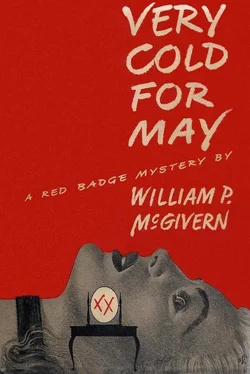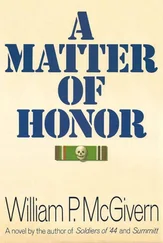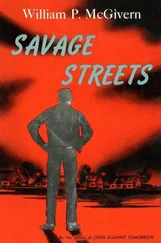The Senator was a commonplace-looking man, with straight, graying hair, appraising eyes, and features somewhat too small and bunched together to be handsome, but which were not unrefined. He was of middle height and his body was spare and well cared for. He wore a gray suit and carried a walking stick.
Jake said, “Hello, Senator. We’ve met before. My name is Harrison.”
“Oh, yes,” Senator Hampstead said. His normal voice was high, affected and irritating. “You’re handling the public relations of that poltroon, Riordan, aren’t you?”
“That’s right,” Jake said, easily.
“You’ve made our job difficult with your tactics. There should be a law that would permit us to lock up men like you.”
“Why don’t you introduce one?” Jake asked. He felt pleasantly angry. “It would hardly be noticed with the rest of your crackpot legislation.”
“Good day,” Senator Hampstead said slowly. And Jake knew he had hurt the man, and that he would never be forgiven. “Come along, Prior,” the Senator said.
“All right,” Prior said. He gave Jake a quick glance and shrugged helplessly as he followed the Senator from the office.
Coombs grinned at Jake. “The Senator is in a rare mood today. Come in, won’t you? No need for us to bark at each other, at any rate?”
Inside the private office Jake saw neat stacks of ledgers and account books on two conference tables. “The Riordan records,” Coombs said, running a hand through his thin hair. “Helluva job going through them. And it’s mine, all mine,” he added with a smile.
“No help?”
“Oh, yes. I’m just looking for sympathy. I have three accountants helping me, and Greg — Mr. Prior — takes care of the legal angles and runs the main show. Did you wish to see him?”
“Yes, but I can leave the message with you. He was looking for a man named Nickerson, who worked in a Riordan plant during the war as a Government inspector.”
“Oh, yes?”
“Well, Nickerson is dead. I thought that would save you some time to know that. That information comes from Riordan, so it’s probably accurate.”
Coombs smiled. “Riordan must be a fascinating man.” He glanced at the books on the tables. “Very bold, very venturesome, very adroit. That’s the impression I’m getting. But I’d better make a note of that fellow’s name. What was it?” He made a record of it on his memorandum pad.
They talked desultorily for a few moments then and Coombs mentioned that he was enjoying Chicago.
“It’s an amazing city,” he said. “I’ve been completely fascinated by some obscure bars on the South Side. The music is genuine, honest-to-God jazz, and the people are just fabulous. We’ve also tried your West Side steak houses, and some of the West Madison Street bistros, but for color only, of course.”
“You’ve got around,” Jake said.
“Yes, Greg is a good guide,” Coombs smiled.
Jake gave him the names and addresses of a few little-known places that were favorites of his, and Coombs made a note of them with an enthusiasm that Jake found rather charming.
“We’ve been to one of these, I think,” Coombs said, “but we’ll try the others if we can find the time. With Senator Hampstead on hand that will be difficult.”
“I can imagine,” Jake said.
They talked desultorily for a moment after that and finally Jake said goodbye to Coombs and went out to the elevators. He glanced at his watch and realized that the working day was about over.
It was five o’clock when he reached the office, and the receptionist told him that Mr. Noble had gone for the day, and also that a package had come for him in the afternoon which the office boy had delivered to his desk.
Jake thanked her and went to his office. He felt tired and depressed, and was glad that he’d missed Noble. There was something wrong with him, he knew.
The package was lying on his desk, a flat object about twelve inches by twelve and two inches thick, wrapped in brown paper and tied clumsily but firmly with strong twine. Jake sat down, untied the knots and tore off the wrapping paper.
The package contained a large leather-bound book. Jake stared at it for a moment without recognition; and then he realized where he had seen it before and a cold tremor went down his back.
This was May’s diary.
Jake sat for a moment holding the diary in his hands, and the only thought in his mind was that two people had died because of what it contained.
From the adjoining office he heard Toni Ryerson humming tunelessly, and he saw that her silken ankles were in their customary position atop her desk. He put the diary down and walked to the doorway that connected his office with Toni’s.
“Mind if I close this door?” he said. “The draft through here is reaching the typhoon class.”
“I’ll try to live,” Toni said.
Jake smiled and closed the door. Returning to his desk he picked up the diary and opened it to page one, which was dated the first of January, 1943.
Flipping to the back of the book he saw that it ended on December 31st, 1948. It was a six-year diary, with each page containing space for three days.
He frowned, trying to guess why the diary had been sent to him, of all people. Assuming for a start that Avery Meed had killed May to get the diary, whoever had sent it to him must be the person who had murdered Meed. But why in God’s name should anyone kill Meed to get the diary, and then mail it to someone else?
Jake opened the diary to the last half of 1944, which was the time that Riordan had known May, and he immediately saw that someone had been at work with scissors. There were pages cut from the diary in every month from June through December of 1944. And it didn’t take him long to see that there was no mention at all of Riordan in May’s diary.
Jake looked at the obvious conclusion for a moment; someone had removed all reference to Riordan from the diary. That could have been Avery Meed. Or it could have been done by the person who murdered him.
For a few minutes he turned this idea over in his head, and then he picked up his phone and called Sheila’s office. When she answered, he asked her if she would step down to his office for a moment. She hesitated, almost imperceptibly, before saying yes.
She appeared half a minute later, wearing a coat, and carrying her bag and gloves. “I was just leaving when you called,” she said.
Jake closed the door behind her and picked up May’s diary from his desk. “I wanted you to see this.”
Sheila glanced at the book and then opened it and began reading. For a few seconds her face was expressionless; but suddenly she caught her breath sharply.
“Where did you get this?” she asked.
“It came in the mail.”
“Who sent it?”
“I have no idea.”
She sat down carefully in the chair behind his desk. “What does it mean, Jake?”
“I’m not sure,” he said. “However, it opens up some interesting ideas. Riordan, you know, sent Avery Meed to get the diary from May. Then someone murdered Meed later that morning and took off with the diary. Whoever sent this to me is probably the person who murdered Meed.”
“Have you looked through it yet?”
“That’s another thing.” He leaned over her shoulder and opened the diary to the last half of 1944. “You’ll notice that someone is collecting Riordaniana. There’s no mention of him in the diary now.”
She said, “Then whoever murdered Meed probably has the dirt on Riordan now.”
“That’s possible.”
“What are you going to do with it?”
Jake grinned ironically. “What do you think I’m going to do?” he said. “I’m going to take a look at how our betters behaved themselves during the war.”
Читать дальше












